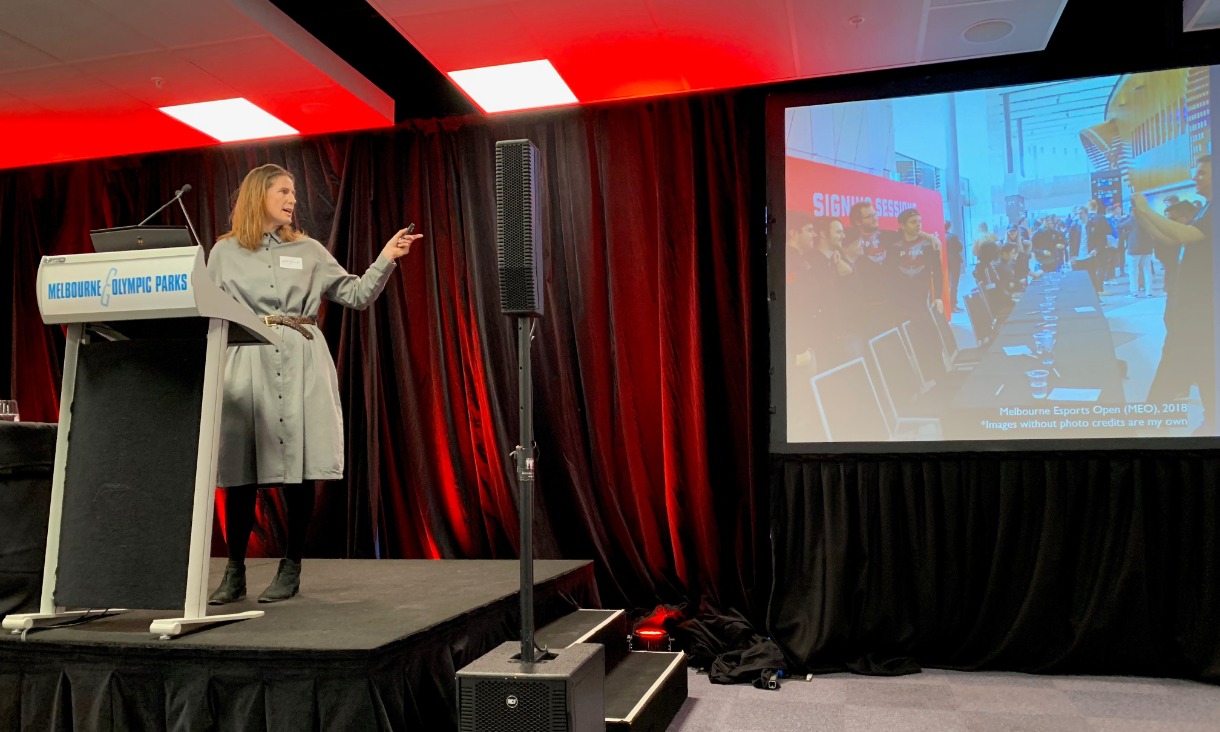
New research into esports
A unique insight into the esports industry has found an increased interconnection and professionalism taking place in this rapidly growing sector.
 RMIT researcher Emma Witkowski shares the findings of her research into esports at the inaugural Bombers Esports in Business Summit at Melbourne Park.
RMIT researcher Emma Witkowski shares the findings of her research into esports at the inaugural Bombers Esports in Business Summit at Melbourne Park.
The Establishing Esports Value research study, developed in partnership between Essendon Football Club and RMIT, provides valuable insights into spectatorship and fandoms, and the state of the most prominent esports league (OPL). It examines the key relationships between players, teams, fans, communities and platforms in the region.
RMIT researcher Dr Emma Witkowski announced her findings at the inaugural Bombers Esports in Business Summit today at Melbourne Park and said the perception of a lawless, ‘anything goes’ mentality undersells advances being made in the sector.
Witkoswski’s examination of one of Australia’s more established esports scenes – League of Legends (Riot Games) – explores how this regional esports ecosystem is currently situated as spectator sport, highlighting the tensions between local-global fan practices, and the issues impeding growth and sustainability for local high-performance esports players, professional industry members and spectators alike.
Essendon Chief Commercial Officer Justin Rodski said the findings will be used to shape the Bombers esports strategy in 2019.
“We believe this study is an important step towards establishing relevance and authenticity in the esports industry,” Rodski said.
“Bombers Esports has made a serious and concerted effort to drive the growth, professionalisation and commercialisation of esports in Australia. This, in turn, will create an industry and ecosystem that has long-term stability and viability.
“The findings from the Establishing Esports Value research will help us to showcase the real value of getting involved in esports for brands and other stakeholders, especially now, before the trajectory takes off.”
Dr Witkowski said Australian esports is on a steady incline.
“Developing the sector is not an isolated task or a simple ‘fix’ through traditional sports involvement or the sudden appearance of a super-star player,” she said.
“Growth for Australian esports will be a slow burn, not a boom, tied to multiple dynamic factors affecting development, and this allows some breathing room.”
Wikowski said that some of the lingering apprehensions she found surrounding esports cultures could be addressed sensibly during this growth period, with productive action (rather than reaction) from all stakeholders.
“This includes addressing questions about cultivating socially-equitable participation in this new leisure/sports sector,” she said.
“Tackling the ongoing challenges surrounding online behaviour in competitive gaming and the issues involved when networked gambling borders a youthful, online, leisure activity, will also be important,” Witkowski said.
This new study is one of a number of research opportunities that were identified when RMIT and Essendon Football Club announced a partnership in March, founded on a desire for cross-industry collaboration and a shared commitment to the community, innovation and enterprise.
The announcement of the esports research project follows the October launch of RMIT’s new Women’s Football Academy, which will create education and development pathways for students and elite athletes and encourage greater participation in women’s football.
For media enquiries: news@rmit.edu.au or 0439 704 077
- Research
- Sport
- Science and technology
- Business
- Industry
Acknowledgement of Country
RMIT University acknowledges the people of the Woi wurrung and Boon wurrung language groups of the eastern Kulin Nation on whose unceded lands we conduct the business of the University. RMIT University respectfully acknowledges their Ancestors and Elders, past and present. RMIT also acknowledges the Traditional Custodians and their Ancestors of the lands and waters across Australia where we conduct our business - Artwork 'Sentient' by Hollie Johnson, Gunaikurnai and Monero Ngarigo.